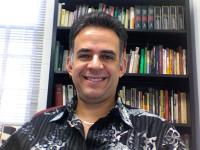SLA Students Shine at AAAL Conference in Texas
Discover the research presented by our students and faculty at the 2024 American Association for Applied Linguistics (AAAL) conference in Houston, TX.


Research in the School of Languages, Literatures and Cultures is interdisciplinary and vibrant.
Faculty and graduate students pursue research in numerous fields of study.
Read More about The Routledge Handbook of Spanish Language Teaching
The Spanish Enlightenment writer Gaspar de Nava Álvarez interrogated eighteenth-century notions of masculinities and sexualities in 'Poesías asiáticas' (Asian Poems 1833), a reworking of original Arabic and Persian verses. I argue that the homoeroticism expressed in 'Poesías asiáticas' forges an Enlightenment-inspired masculine identity of Muslim men that deconstructs stereotypical images of lascivious and violent Islamic predators. The deployment of positive imagery of desire between Muslim men redirects Spanish Enlightenment poetry away from French influences and invokes Islamicate discursive images as a sort of new Arcadia in the Spanish collective imaginary and as a source of poetic inspiration.
Gastronomica (2019) 19 (2): 87–95.
In a time when literature is accused of being self-centered and overly narcissistic, women’s autofiction in France since the turn of the millennium has been received with controversy because it disrupts readily accepted ideas about personal and national identities, gender and race, and fiction versus autobiography. Through the study of polemical writers Christine Angot, Chloé Delaume, and Nelly Arcan, I contend that, by recounting personal stories of trauma and sexuality, and thus opposing themselves in opposition to social convention, and by refusing to dispel doubts regarding the fictional or factual nature of their texts, autofiction resists and helps redefine categories of literary genre and gender identity. This book analyzes concurrently the textual and sociopolitical implications that underlie the (de)construction of the autofictional subject, and particularly how these writers constantly redefine themselves through performance and self-fashioning made possible by media and technology. Moreover, this work raises important questions relating to the media’s complicated relationship with women writers, especially those who discuss themes of trauma, sexuality, and violence, and who also question the distinction between fact and fiction. Proposing a new understanding of autofiction as a form of littérature engagée, this work contributes to a broader understanding of the French publishing establishment and, of the literary field as a cultural institution, as well as new insight on shifting notions of identity, the Self and nationalism in today’s ever-changing and multicultural French context.

Juan Carlos Quintero-Herencia, professor Spanish and Portuguese in the School of Languages, Literatures, and Cultures, received a grant from the Latin American Studies Association (LASA) to host an symposium at the University of Maryland in Spring 2019 on Spanish Caribbean literature and culture.
This proposal describes the design and organization of an experimental symposium focused on the critical reconsideration of periods, situations and texts that have been polemics in the modern and contemporaneous Spanish Caribbean. It is, in addition, an intriguing proposal for its promise to combine esthetics and policy, literary critique and analysis of the current political, economic and environmental uncertainties that confront the societies of the Caribbean.
In Latin America, the Caribbean occupies a secondary or inferior position, and is often overlooked. This project makes a significant effort to increase the academic visibility of this region, therefore it obtained a high score in the evaluation of the potential of its impact criteria.
The organizers and participants in the symposium, who come from different countries in the Hispanic Caribbean and other countries, show an excellent transnational and hemispheric commitment that includes the United States, Canada, Europe and Latin America, and seek to be involved in the proposed discussion and to supply texts to established and emerging academics, from a great variety of institutions. In summary, it is an original project, it is very well developed and is clear in its proposals, objectives and use of the budget.
The project selection committee in this cycle was presided over by Mara Viveros-Vigoya, Universidad Nacional de Colombia, Vice President of LASA and President-elect, and included the participation of María Victoria Murillo de Columbia University; Emiliana Cruz, from Ciesas, México DF, Vivian Andrea Martínez-Díaz, Universidad de los Andes and Jaime A. Alves of CSI/CUNY and Universidad ICESI/Colombia, former winner of the FORD-LASA grant in 2015.